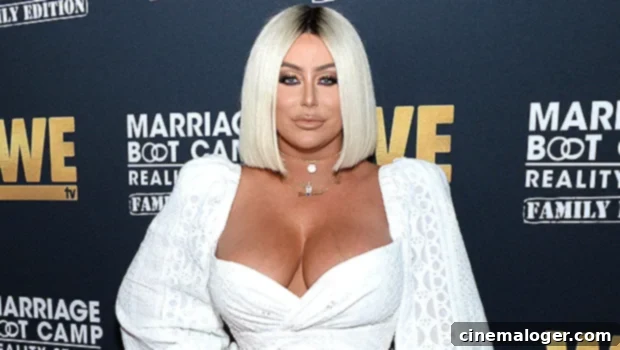Aubrey O’Day Transforms Profound Miscarriage Grief into Empowering Anthem “Unborn Love”
In a raw and poignant display of vulnerability, singer and television personality Aubrey O’Day has bravely channeled the immense pain of losing her unborn child into a powerful new musical offering. Her latest track, “Unborn Love,” released on March 16, serves as an emotional testament to a “real-life nightmare” and offers solace to countless individuals grappling with similar heartbreaking experiences. This release arrived just ten days after she publicly disclosed the devastating news of her pregnancy loss, marking a rapid and courageous artistic response to profound personal tragedy.
The deeply moving ballad, “Unborn Love,” transcends mere entertainment, becoming an intimate chronicle of O’Day’s journey through grief. Its lyrics are unflinchingly honest, painting a vivid picture of disbelief and emotional turmoil. “Stuck in disbelief / I watched my body turn on me / A real-life nightmare on repeat,” she sings, articulating the profound sense of betrayal and trauma that often accompanies miscarriage. These lines resonate deeply, capturing the feeling of one’s own body failing, a sentiment shared by many who have endured such a loss. The repetition of “nightmare” emphasizes the cyclical, intrusive nature of grief, where sorrow can feel inescapable and endlessly recurring.
Beyond the immediate anguish of her loss, Aubrey O’Day’s lyrics delve into an additional layer of personal struggle, hinting at past wrongs and unresolved issues with a former partner. The song poses introspective questions that many might ask during moments of intense suffering: “Asking myself am I still being punished/ For the sins when I was still young and stupid / How much more do I have to learn before I’m forgiven?” This segment adds a complex dimension to her grief, suggesting that the pain of her miscarriage might have triggered deeper reflections on accountability, past mistakes, and the quest for redemption. It highlights how personal tragedy can often intertwine with broader life narratives, bringing up old wounds and forcing a reevaluation of one’s journey and relationships.

The Therapeutic Power of Music and Community on Instagram
Prior to the official release of “Unborn Love,” Aubrey O’Day candidly shared her emotional connection to the song and its profound purpose through a heartfelt Instagram post. She revealed that the song was not just an artistic endeavor but a deeply personal one, stating, “I made this song for my own therapy and for any woman in the world who has ever suffered a miscarriage.” This declaration underscores the dual function of her music: it acts as a cathartic outlet for her own healing process while simultaneously extending a hand of solidarity to a global community of women united by a shared, often silent, pain.
O’Day’s vision for “Unborn Love” extends beyond the auditory experience. She also announced plans to release a music video compiled from direct messages (DMs) sent by women who have experienced miscarriage. This innovative approach aims to “empower our tribe and share their stories,” fostering a collective space for remembrance, understanding, and mutual support. By integrating these personal narratives, Aubrey is transforming her individual grief into a powerful collective testament, giving voice to those who may have felt isolated in their sorrow. This initiative brilliantly leverages the power of social media to build a community, turning digital interactions into a source of real-world healing and connection. She expressed her sincere hope that this project would bring “me, you, US… more healing,” emphasizing the communal aspect of recovery and the importance of shared experiences in overcoming trauma.
Navigating Grief, Accountability, and Cosmic Perspective
In her candid reflections on the song, Aubrey articulated a nuanced perspective on her personal circumstances, particularly highlighting the challenge of navigating such a profound loss without a partner. “I hold myself accountable on this song, but also felt I needed to be honest about going through these months of being pregnant and the grief of my miscarriage without a present partner,” she explained. This statement speaks volumes about the multi-faceted nature of grief, which can be compounded by feelings of loneliness and a lack of immediate support. It takes immense courage to publicly acknowledge such a personal and sensitive detail, offering a rare glimpse into the complex emotional landscape of her journey. Her honesty not only deepens the listener’s understanding of her pain but also validates the experiences of others who may have faced similar situations.

Aubrey O’Day also shared a philosophical outlook that has guided her through this difficult period. “I truly believe that things don’t happen to you, they happen for you,” she mused, reflecting a mindset of resilience and growth even in the face of adversity. This perspective reframes suffering not as a punitive experience but as a catalyst for deeper understanding and personal evolution. It suggests that every challenge, no matter how painful, carries a lesson or serves a higher purpose in one’s life journey. She further elaborated, “If you are getting closer to your vision that is usually when you feel the most uncomfortable.. so ultimately I just let the universe lead me on this one.” This sentiment speaks to a profound trust in the universe’s plan, an acceptance of discomfort as a sign of impending progress, and a willingness to surrender control during times of immense vulnerability. It’s a powerful message of faith and spiritual guidance amidst profound human sorrow.
Aubrey’s Initial Announcement and Call for Connection
The initial announcement of Aubrey’s miscarriage came nearly two months after she first joyfully revealed her pregnancy. In an interview with E! News on March 6, the Danity Kane singer shared her devastating news, stating, “I’m beyond heartbroken to announce that I’ve had a miscarriage.” Her words conveyed an acute sense of loss, yet also held a glimmer of hope and unwavering belief in future possibilities: “When my baby is ready, he/she will come and forever be my grateful miracle.” This sentiment offers comfort to many, reflecting the universal yearning for a child and the enduring hope that springs eternal even in the deepest despair.
In the same interview, Aubrey extended a profound invitation to her followers, encouraging anyone who had experienced a miscarriage to reach out to her on Instagram. Her intention was clear: to offer herself as a “sounding board and someone you can confide in.” This gesture solidified her commitment to fostering a supportive community, moving beyond simply sharing her story to actively engaging with and supporting others through their grief. It highlights her compassionate spirit and her desire to transform personal tragedy into a platform for collective healing and mutual aid.
Breaking the Silence: The Broader Impact of Celebrity Vulnerability
Aubrey O’Day’s decision to openly share her miscarriage experience and channel it into her music carries significant weight, particularly within the often-glamorized world of celebrity. Miscarriage, despite its prevalence – affecting an estimated 10 to 20 percent of known pregnancies – remains a subject frequently shrouded in silence, stigma, and personal shame. Many individuals suffer in isolation, feeling misunderstood or unwilling to share their pain publicly.
When public figures like Aubrey O’Day step forward with such raw honesty, they contribute immensely to dismantling this stigma. Their vulnerability normalizes conversations around pregnancy loss, validates the profound grief experienced by parents, and assures countless others that they are not alone. By using her platform to discuss “Unborn Love” and invite others to share their stories, Aubrey is fostering an environment of empathy and understanding. Her actions provide not only emotional support but also encourage a wider societal dialogue about reproductive health, mental wellness during grief, and the importance of compassionate care for those experiencing such a difficult loss.
Her journey, from the initial heartbreaking announcement to the therapeutic creation of “Unborn Love” and her efforts to build a community of shared experience, exemplifies the transformative power of art and connection in the face of profound personal adversity. Aubrey O’Day has not only created a song; she has forged a beacon of hope and understanding for a topic that desperately needs more light.
